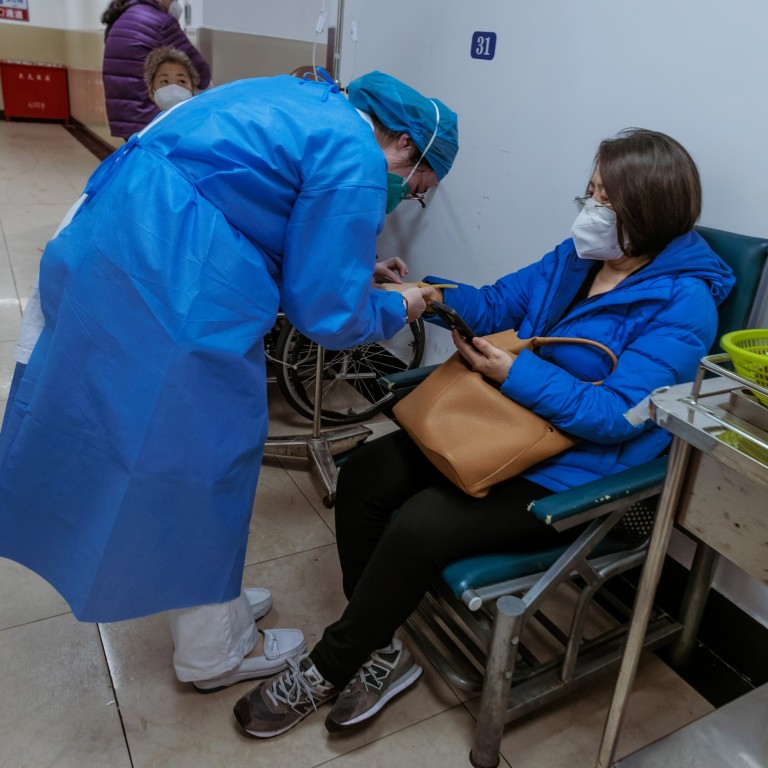
Covid-19: China’s ‘exhausted’ doctors and nurses work long hours for reduced pay
- Doctors and nurses in some of China’s public hospitals are facing pay cuts or salary delays amid a surge in coronavirus cases
- Beijing’s zero-Covid policy over the past three years has exacerbated fiscal strain on some local governments
Already overwhelmed by the surge of infections after Beijing’s abrupt shift from its zero-Covid policy, doctors and nurses in some Chinese public hospitals are facing pay cuts or salary delays that have hammered morale.
Dr Zhou, a surgeon at a hospital in a large southern city, said he has not been paid for three months following the recent influx of Covid-19 patients.
“The last payment we received was much less than usual,” said Zhou, who wished to remain anonymous because of the sensitivity of talking to the media.
His salary was cut by nearly 4,000 yuan (US$590) in September.
If we quit at this time, [the hospital] will put our personnel files on a blacklist
“The hospital has also cancelled our quarterly and year-end awards in 2022, and medical staff morale is now very low,” said the doctor, who has worked long hours to treat infections.
Zhou’s annual year-end bonus was close to 60,000 yuan before the outbreak. But following the impact of the pandemic on the hospital’s revenue, Zhou saw it gradually reduced until it was cancelled.
“The hospital gave us no explanation, it just didn’t pay out, and we all mocked ourselves for working on loans,” he said.
Still, Zhou does not have the luxury to resign from his current job.
“The hospital won’t allow us to resign; if we quit at this time, it will put our personnel files on a blacklist, which is actually an entry ban for us to work in the public hospitals in the future,” he said.
Despite many municipalities saying infections have peaked, hospitals are still filled with patients and medical staff are working extra long hours.
Tight finances have been an acute headache for local governments in China over the past few years.
For 3 years zero-Covid haunted China’s economy. It’s gone, but the scars remain
A nurse at another public hospital in the same city, Miss Wang, has had her salary cut by nearly half since the pandemic began in 2020.
“My pre-tax salary has dropped gradually from 24,000 to 13,000 yuan a month, but we are actually working under greater pressure than doctors, and we are very exhausted after the large volume of Covid patients admitted recently,” said Wang, who was also unwilling to reveal her real name.
“The hospital also removed our bonuses and performance [last year]. Now our income has been cut by a terribly large amount while our workload increased.”
Wang said the local government announced a bonus of up to 20,000 yuan for each of the pandemic-weary medical staff this month, but it has yet to be paid out.
We are not sure if it is being withheld by the hospital or if this is just a temporary placebo to increase our faith
“We are not sure if it is being withheld by the hospital or if this is just a temporary placebo to increase our faith,” Wang said.
According to China’s Ministry of Finance, local general public revenue for the first 11 months of last year was 10 trillion yuan, down by 3 per cent from the previous year, while local public expenditure was 19.6 trillion yuan, up by 6.2 per cent year on year.
Ding Shuang, chief Greater China economist at Standard Chartered Bank, said zero-Covid over the past three years has exacerbated fiscal strains on some local governments.
“This can explain why China’s Covid policy is loosening abruptly, as the decline in government public revenues led to pay cuts and delays in payment,” said Ding.
The exit from the zero-Covid policy could help ease pressure on local governments, which may see revenues bounce back in the short term and ease healthcare pay delays, according to Ding.
“Local finances were poor in the first nine months of last year, but this eased from the fourth quarter onwards and as the economy restarts government public revenues are picking up,” Ding said.


.jpg?itok=qK7RpETx)